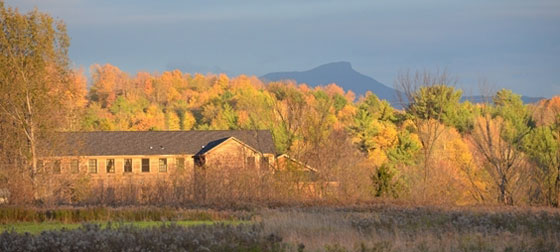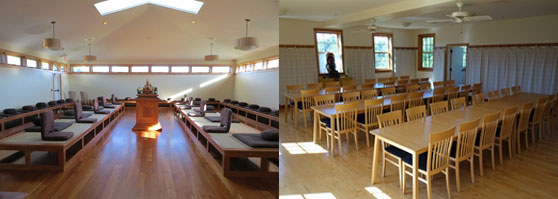The Vermont Zen Center is a Buddhist community, founded to provide a warm and inviting place for the study and practice of Zen Buddhism. The Zen Center’s mission is to create a peaceful and inviting environment to support those who seek wisdom, compassion, joy, and equanimity within a Buddhist context. The twofold practice of the Center is to overcome the causes of suffering through spiritual development and to alleviate the world’s suffering through outreach activities and the cultivation of a caring attitude to the earth.

History
The Zen Center was established by Sunyana Graef, Roshi in 1988 with two members who, along with the Graef family, practiced in a room in the Graef’s residence. By 1991 the Center had outgrown its small quarters and moved into a house just down the street. The generosity of members and friends allowed for the purchase of the house and the Center soon began building a meditation hall (zendo) and planting gardens.
The Center now has a comfortable site for conducting sittings, sesshins (retreats), ceremonies, study groups, and other activities. A major expansion of the Zen Center was completed in 2003 adding dorms, a large kitchen and a dining room. A second major expansion was completed in August 2011. It added a new zendo (meditation room), a reception room and additional dorms, completing our retreat facility. The former zendo is now a Buddha Hall for chanting, ceremonies, and other purposes.

Methods
The methods of Zen Buddhism practiced at the Vermont Zen Center stem from those taught by Roshi Philip Kapleau, whose teachings were in turn influenced by Zen Master Harada Daiun Roshi’s blend of the ancient sects of Soto and Rinzai Zen.
The foundation of our practice is zazen, which means sitting with one-pointed concentration. Zen practice is expressed in daily life through the attentiveness and awareness which we bring to every single moment. Our sitting practices include both shikan-taza and breath awareness, as is commonly done in the Soto Zen tradition. It also includes koans, or spiritual inquiries, as in the Rinzai tradition. In the zendo we sit facing the wall rather than facing out. Most chanting and liturgical recitation is done in English.
Zen training arises out of the Buddhist tradition but can serve as a valuable adjunct to any religion, calming and centering the mind, and promoting stability, mindfulness, and clarity.
Address: 480 Thomas Rd, Shelburne, VT 05482
Phone: 802-985-9746
E-mail: info@vermontzen.org
Website : vermontzen.org




